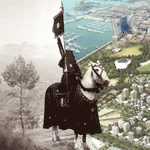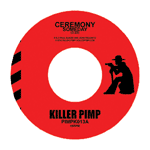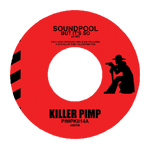- Administrator
- Albums and Singles
 Working alone, Marchetti has solidly established himself as truly a shaman of sound. His combination of worldwide field recordings and subtle treatments has created a world that is both alien and familiar, warm and harrowing. Here working alongside Yôko Higashi, the two weave sound that goes from the industrial realm into the wilds of Africa, and then back again.
Working alone, Marchetti has solidly established himself as truly a shaman of sound. His combination of worldwide field recordings and subtle treatments has created a world that is both alien and familiar, warm and harrowing. Here working alongside Yôko Higashi, the two weave sound that goes from the industrial realm into the wilds of Africa, and then back again.
The opening piece, "Pétrole 73," is Marchetti solo, composed in 2005. Using only some rudimentary synthesizers, field recordings on the ship Stubnitz, and CB radio conversations, the sound is pure industrial isolation. The track maintains a sense of disconnected tension through its entire duration, focusing on the hollow, bassy nautical clattering of the ship, with sustained car-horn like drones that never seem to relent, but instead grow in intensity throughout. Whether this is truly happening or is just a psycho-acoustic reaction to the repetition, I can’t say for sure. The sound only stops when the “trip” comes to its end, leaving only the hollow, rumbling ambience of the boat that somehow manages to be comforting, even through the sonic chaos.
The second piece, "Okrua," is that of Ms. Higashi alone. In comparison, it is a longer piece focused more on traditional ambience at its onset. The synthesizer based ambience eventually gives way to field recordings after a healthy amount of static and digital interference. Like Marchetti, Higashi displays great skill in creating miniature dramas based on ambient recordings. Beginning with birds and the sound of motion, the journey’s calm is interrupted by music in the distance, dogs barking, and a festival like atmosphere. The music and voices of Mozambique are the warmest and most inviting part of the recording though, as things begin to take a turn for the worst with chaotic movements, ragged percussion, and disembodied radio communications before ceasing, leaving only the distant sound of music and birds.
The final piece, "Pétrole 42," is the collaborative track between the two artists, with Marchetti focusing on weaving dark and shimmering drones via synthesizer and tape, while Higashi provides vocals, the combination of which maintains the tension and isolation of the opening piece, but there is a greater since of levity here, where the tension does not feel as if it is going to end badly, just that the culmination will lead to a comfortable release. The closing sound of what is likely the creaking Stubnitz ship ends the work in an eerie sense of calm.
While I usually find Lionel Marchetti’s work dark, it usually has more organic and spiritual creepiness to it. For me, it conjures images of witch doctors, dark jungles, and movements seen from flickering fires. Here it is a darkness that comes from mechanical isolation and a sense of dread due to the actions of man, not the supernatural. It is a fascinating journey, though I think I still prefer Mr. Marchetti focusing on the supernatural more than the industrial.
samples:
Read More
- Administrator
- Albums and Singles
Ici d'ailleurs reissues Matt Elliott's last 3 albums in "Songs", a deluxe box containing 7 vinyls including one with 7 unreleased Failed Songs.

4 colors printed hard box containing
- 7 clear vinyl 12" in black printed brown cardboard sleeve
- a MP3 download ticket
The reissue is also available in a low price CD box set. And for those who already owns one of it, the vinyls and Failed Songs are or will be available separatly on our websites.
> preorders opened on our online shop
Matt Elliott "Live @ Le Grand Mix" DVD offered
The vinyl box will be signed by Matt Elliott!
Failed Songs
unreleased tracks from last 3 albums recording sessions
01. Mellow 02. Eulogy For Liam 03. Melange 04. South Canadian Sea 05. Song To Child 06. Lament 07. Wedding Song
Howling songs [Brainwashed review ]
01. The Kübler-Ross model 02. Something about ghosts 03. How much in blood ? 04. A broken flamenco 05. Berlin & Bisenthal 06. I name this ship the tragedy, bless her & all who sail with her 07. The howling song 08. Song for a failed relationship 09. Bomb the stock exchange
Failing songs [Brainwashed review ]
01. Our weight in oil 02. Chains 03. The seance 04. The failing song 05. Broken bones 06. Desamparado 07. Lone gunman required 08. Good pawn 09. Compassion fatigue 10. The ghost of Maria Callas 11. Gone 12. Planting seeds
Drinking songs [Brainwashed review ]
01. C. F. Bundy 02. Truying to explain 03. The guilty party 04. Whats wrong ? 05. The Kursk 06. What the fuck am I doing on this battlefield 07. A waste of blood 08. The maid we messed
Read More
- Administrator
- Albums and Singles
January 26, 2010
US CD Killer Pimp PIMPK012
- I
- II
- III
- IV
- V - [MP3]
- VI
- VII
- VIII
- IX
- X
Marc Ngyuen - guitar, keyboard and electronic
Guillaume Ollendorff - laptop and electronic
Live en San Antón is the result of a three days session of improvised music committed by Marc Nguyen and Guillaume Ollendorff recorded in the barrio San Antón, in the southern Spanish city of Alicante in April 2008.
Marc & O. have known each other for 13 years: they once worked together for a company that sold missiles and celebrity magazines; they later played and toured together in Marc's electronic-rock band project, called Colder. Guillaume has made music here and there (Tsé, The Mainstream Ensemble, Dust and Chimes) and now, has a life as an independant publisher of Philosophy. After all these years, this is the first time they have actually recorded together.
The intent of Scratoa! should be understood at the very moment you press play. It sounds like it is named. As some kind of big musical lapsus,the kind of ones kids do everyday with toys. A Vomited and improvised - somehow elegant, sometimes not - non sense. A musical role playing game experiment in ten parts, where Tex Avery, Baruch Spinoza and Herbie Hancock's spirits have been called over three nights to conduct a crowd of gorillas, frogs, cats, birds and ducks in heat, forgotten cartoon characters, families of gypsies and guitars, local pagan marching bands, and drunk kids armed with fire crackers.
Experiencing Scratoa! will probably not cure any disease nor it will help you improve some social skills either. But listening to this first session may however be recommended for all these tiny moments of your life when all you fancy is just a good old fix of primitive poetry.
For more information see myspace.com/scratoa
Read More
- Administrator
- Albums and Singles
January 26, 2010
US 7" Killer Pimp PIMPK013
- Someday - [MP3]
- Cracked Sun
Paul Baker - vocals, guitar, bass, drum machine
John Fedowitz - vocals, guitar, bass, drum machine
Before there was A Place To Bury Strangers, there was Skywave, a three piece noise pop band from Fredericksburg, Virgina. When Ollie left to move to NYC, Paul and John remained and reorganized as Ceremony. While there will be undeniable comparisons made to APTBS (they still remain friends and share an affinity for loud guitars), Ceremony employ a songcraft far more focused on making catchy pop tunes than blowing out speakers and eardrums.
Limited to 500 copies this 7" single is a teaser for the duo's LP & CD on Killer Pimp, Rocket Fire, due early 2010. "Cracked Sun," the B-side is exclusive.
For live dates, videos, and more information see myspace.com/ceremonytheband
"some very fine noise-pop" - Built on a Weak Spot
"Ceremony's music is a superb hybrid of dark noisy pop, shoegaze, and electro; the result is a sound both unique and nostalgic." - Superstarcastic
"Utterly exhilarating" - Opus
someday
when it's cold and the world is gray
and the rain won't go away
i see your smile and your glowing face
the rain is gone without a trace
sweetness under the moon
or a sunny afternoon
take my heart and my life
cause someday you'll be my wife
someday
when it's dark and it's winter cold
my hands are numb too frozen to hold
in the black of my blackest nights
i'll be burning underneath your light
sweetness under the moon
or a sunny afternoon
take my heart and my life
cause someday you'll be my wife
someday
Read More
- Administrator
- Albums and Singles
January 26, 2010
US 7" Killer Pimp PIMPK014
- But It's So (7" mix) - [MP3]
- Makes No Sense
Kim Field - Vocals, Q-Chord, Omnichord, Keyboard
John Ceparano - Guitar, Bass, Vocals
Mark Robinson - Keyboard
James Renard - Drums
Sanford Santacroce - Bass
Mastered by Jeff Lipton at Peerless Mastering
Classic pop songwriting fused with hard driving disco backbeats... hooky bass lines... layered, shoegazey guitars and floating, atmospheric synths with Kim Field's unmistakably sincere and distinctively un-affected ethereal vocals.
Both songs are from the forthcoming LP & CD Mirrors In Your Eyes, Soundpool's third full-length album, due early 2010 on Killer Pimp.
For live dates, videos, and more information see soundpoolmusic.com
"Soundpool. The best fucking band in the world!" - Ulrich Schnauss
"Reminiscent of French pop via Air or Stereolab... fine dream pop." - Pitchfork
"Captivating blend of shoegaze, space rock and wonderful soundscapes" - Radiofreedavid.com
"Few new artists match Soundpool's vocal delivery and sonic awareness" - Musicisnotdead
"Slowdive for the new millennium" - David Mansdorf, Losing Today
"When Lush wrote Sweetness and Light at the height of shoegazing, I wonder if they had anticipated Soundpool" - Brett Spaceman, EVILSPONGE
but it's so
i can't tell you why it is like this
i don't know why time hasn't come
i can't tell you where it is going
i don't know why we've not become
but it's so
though i'm not sad today
yeah it's so
but it won't hurt today
won't you tell me it doesn't matter
make me believe worries can hide
but it's so
though i'm not sad today
yeah it's so
but it won't hurt today
yeah it's so
Read More
- Administrator
- Albums and Singles
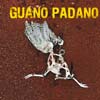 Combining country, American surf music and the classic Ennio Morricone Spaghetti Western soundtracks, this album sounds like a lost gem from the '60s. However, this trio (supplemented by some seriously cool guest musicians) are not just an ersatz tribute to the past. This is a brilliant homage to these various styles of music that has buckets of enthusiasm and passion to make up for its lack of modernity.
Combining country, American surf music and the classic Ennio Morricone Spaghetti Western soundtracks, this album sounds like a lost gem from the '60s. However, this trio (supplemented by some seriously cool guest musicians) are not just an ersatz tribute to the past. This is a brilliant homage to these various styles of music that has buckets of enthusiasm and passion to make up for its lack of modernity.
This band is tight but they are comfortable enough in each other’s playing to not sound formulaic or over-rehearsed. The music flows in a way that brings to mind the rougher side of surf music, leaving The Beach Boys out in the sun while unkempt youths play their guitars in the shade. The guitar playing of Dick Dale ghosts through this album as the ragged but precise fretwork from Alessandro Stefana provides a treat for the ears. “Epiphany” puts a film noir spin on their music, sounding like Fantômas’ mutilation of Morricone’s “Investigation of a Citizen Above Suspicion” (Stefana has worked with Mike Patton in the past).
The echoes of Morricone are more than just an influence, “El Divino” and “Bull Buster” feature the whistling talents of Alessandro Alessandroni who is responsible for those whistles in the Sergio Leone films. It is impossible not to think of these Guano Padano tracks as out-takes from the Spaghetti Western soundtracks as the group have created a very authentic sounding Morricone-tribute (“El Divino” may as well have a writing credit for Morricone beside it, so perfect does it sound). Another famous guest pops up on “A Country Concept,” namely Gary Lucas (formerly of The Magic Band and guitarist for countless other artists). Here Lucas plays a resonator guitar to add a more authentic Wild West feel to Guano Padano’s music; his bluesy ambience giving the impression that a gunfight is about to go down.
Yet another strand of influence runs through the album as Guano Padano appear to be as serious about American country music as they are about their other passions. A cover of Hank Williams’ “Rambling Man” makes an appearance later in the album, Guano Padano bringing fresh life to the song. Bobby Solo’s vocals are especially evocative; rich with years of experience, his vocals are like grit being blown against the corrugated steel roof of Stefana’s guitar. It is too bad that Solo only appears on this one song, an entire album like this would be something else.
Recently I have been getting more into surf music thanks to exposure to things like Neil Young’s early group The Squires and having a listen to an old tape copy of the Pulp Fiction soundtrack. However, this renewed interest aside, Guano Padano would have struck a chord with me in any case as they are fantastic on their own. Granted their music is not exactly original but it is refreshing in its whole-hearted embrace of styles usually picked apart by modern bands in search of something new hidden in their corpses.
samples:
Read More
- Administrator
- Albums and Singles
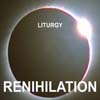 The world does not need another black metal band but the guys from Liturgy don’t care. This is fine by me as this is one of the best albums in the genre for a long time. Consolidating the ground won via their Immortal Life EP, the group has expanded in size and in scope. Instead of focussing on a scary aesthetic and not coming up with decent music, they have gone the opposite route of 99% of most modern black metal groups and actually made music worth listening to.
The world does not need another black metal band but the guys from Liturgy don’t care. This is fine by me as this is one of the best albums in the genre for a long time. Consolidating the ground won via their Immortal Life EP, the group has expanded in size and in scope. Instead of focussing on a scary aesthetic and not coming up with decent music, they have gone the opposite route of 99% of most modern black metal groups and actually made music worth listening to.
Starting softly with a short untitled track, Liturgy lured me into a false sense of security and as such the shattering whirlwind of “Pagan Dawn” hit doubly hard. Hunter Hunt-Hendrix’s vocals are a pained howl, incoherent screams that sound more like the snarls of beast being devoured than anything. The inclusion of a drummer gives the music a more visceral edge, Greg Fox hits the skins like a force of nature. This orientates the music towards the more traditional ground of black metal but Hendrix’s off-kilter approach to the genre prevents Liturgy from becoming another forgettable addition to the genre’s ranks.
It is a bit of critical stereotype for me to compare the sound of the band to a winter wind but Liturgy do manage to make the temperature drop. The twin guitars of Hendrix and Bernard Gann are like the bracing gusts of frigid air that whip through the northern fringes of civilisation. Embodying this freezing mood is “Beyond the Magic Forest,” which may be a bit of a wimpy title but the music could never be described as such. The grinding drums going from a funereal pulse to a frenzied blast beat drive the music into the back of my skull.
Interspersed throughout the album are a number of brief untitled pieces (like the one that opens the album) where the group change tact completely and focus on more ambient sounds. These tracks are reminiscent of prison-era Burzum and Ulver’s experimentations outside of black metal. The long vocal drones with electronic accompaniment add a ritualistic air to Renihilation and provide a fitting contrast to the harsher black metal tracks, reinforcing their already formidable presence.
The final two tracks form a one-two punch that will send any listener down for the count; “Behind the Void” and the title track combined make some of the best black metal to cross my path recently. While Wolves in the Throne Room would be the closest point of reference for Liturgy, in this case the wolves found on Renihilation are feral and hungry. Liturgy are on to something special here, reinvigorating a sound that has been abused and gentrified over the last decade into something resembling its former glory.
samples:
Read More
- Administrator
- Albums and Singles
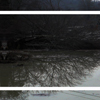 Released a few months prior on cassette (continuing the underground’s fetishization of that unreliable magnetic media format), this live recording appears on the wider CD format, remastered to take better advantage of the digital media, and continues this new but prolific band’s trek into dense, heavy drone that somehow manages to keep lighter, airy ambient moments appearing in the otherwise gray mist.
Released a few months prior on cassette (continuing the underground’s fetishization of that unreliable magnetic media format), this live recording appears on the wider CD format, remastered to take better advantage of the digital media, and continues this new but prolific band’s trek into dense, heavy drone that somehow manages to keep lighter, airy ambient moments appearing in the otherwise gray mist.
Essentially a single, hour long track split into two parts (mimicking the cassette’s original A and B sides), Rain of Ashes brings in even more elements to the duo’s normally guitar/electronic sourced metal tinged drone/doom. The introduction’s shimmering guitar feedback over a simple electronic bed is not far removed from the band’s earlier works, but the building complexity of guitar tone is extremely dynamic, alternating between melodic post-punk tones and shrill piercing feedback, all the while the frozen wall of electronic textures stay in place. Eventually the noise shifts away to allow the subtle low end electronic sounds to move forward.
The most drastic change happens when the darker ambient electronics pull away and is replaced by a simple 8 bit digital melody and rapid guitar plucking that, at first, sounds gentle and nostalgic (but perhaps that’s just my childhood memories of playing Nintendo speaking). This turns from nostalgic to sinister as soon as the digital ambience comes back, thrusting the lo-fi melody into some creepy rendition of John Carpenter’s Halloween theme. This returns again towards the end of the entire piece, but first is quickly cut up by chugging metal drone guitar before falling apart into pure red-lined harsh noise.
Now, it is somewhat of a cop-out when the second half starts, as it is simply the first 30 minutes again, just now in reverse. The nature of the sound, however, belies this fact. Without careful study, it does just seem like structurally the track mirrors itself, but the individual tones and textures take on a different quality once played backwards. The reversed guitar tones from the introduction (now at the conclusion) change the most distinctly, now resembling the best moments of The Cure playing doom metal.
Rain of Ashes once again demonstrates Locrian’s combination of metal drone and noise, but continues the infusion of more meditative ambience and a subtle hint of post-punk rock that isn’t usually referenced in the heavier stuff. Personally I’d like to hear it become an even more dominant part of their sound, and their always evolving sound leads me to believe there could be a drone metal Echo and the Bunnymen cover someday. Maybe.
samples:
Read More
- Administrator
- Albums and Singles
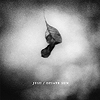 In interviews leading up to this release on Mark Kozelek's (Red House Painters) label, Justin Broadrick said he had intentionally set out to make a "pop" record. Considering many of the prior Jesu EP’s (Silver, Lifeline, Why Are We Not Perfect) were already creeping into this territory, the fact this might be his most conventional release is not shocking. However, with Broadrick’s return to organic guitar sounds, the combination puts this surprisingly as close to Godflesh as any of his recent releases have been.
In interviews leading up to this release on Mark Kozelek's (Red House Painters) label, Justin Broadrick said he had intentionally set out to make a "pop" record. Considering many of the prior Jesu EP’s (Silver, Lifeline, Why Are We Not Perfect) were already creeping into this territory, the fact this might be his most conventional release is not shocking. However, with Broadrick’s return to organic guitar sounds, the combination puts this surprisingly as close to Godflesh as any of his recent releases have been.
Caldo Verde (US)/Daymare (JP)
Broadrick has stated before that many Jesu releases are collections of songs recorded at different times that simply work well together. Given this was a specific conceptual recording, the sound is quite consistent throughout, almost to a point of same-ness. Across an entire album, this would possibly get tedious, but in this sub-30 minute format, it doesn’t overstay its welcome.
From the opening swell of guitar feedback that introduces "Losing Streak," the intentionally organic sound is light years away from the electronics heavy split with Envy and the Lifeline EP, instead there’s a guitar sound that could be off any classic Godflesh record. While they had a reputation as being “metal” at times, classic tracks like "Slateman" or "Don’t Bring Me Flowers" had a notable undercurrent of pop music that is allowed to shine more here.
"Opiate Sun" and "Deflated" both follow a similar blueprint to the former, slow, intentionally repetitive structures with vocals that don’t stray into the metal realms the ones on Infinity did. All of the tracks here also put a greater emphasis on simple, yet beautifully melodic guitar solos that too often were ignored in favor of low register chugging riffs. "Morning Light" initially focuses on the monolith guitar tones, but as it winds to a close more melodic guitar work takes the focus.
A few notable consistencies exist across the four songs on this album. For one, Broadrick has chosen to incorporate harmony into his vocals, which is something he rarely did prior. Most of the tracks have double tracked vocal lines that work, giving the entire disc a more melodic, melancholy sound. Secondly, the organic sound stretches beyond just the guitar tone: few keyboard parts are to be heard, and there is live drumming (by Broadrick) on all tracks. While his drumming remains somewhat rudimentary, his former band Head of David griped he kept trying to play the first Swans album on every track (a criticism that is still relevant to this to some extent), it does keep the sound from becoming too stiff and simplistic.
As per usual, the Japanese pressing on Daymare adds an additional track, in this case a demo take on "Deflated" that does have a thinner overall sound: the guitar is less effected and has a far more jangly tone than Broadrick’s usually known for. The biggest difference is the more melodic guitar soloing that comes in midway through, which eventually gives way to some rudimentary piano playing that was probably removed to give it a more "rock" sound in the final take. Personally, I prefer this more delicate, gentle take on a track that was already rather soft.
While I’m not sure how this disc will stand the test of time, given that I return to Conqueror quite a bit, but the more pop-oriented Silver EP doesn’t get played as much, on the surface it is a rather beautiful piece of music that continues Jesu’s mission of creating the heaviest shoegaze music possible admirably.
samples:
Read More
- Administrator
- Albums and Singles
 This second volume of Analog Africa's excellent Orchestre Poly-Rythmo career retrospective is yet another treasure trove of lost Afro-funk gems. While a bit slicker than its predecessor, the heavy voodoo grooves remain and should serve to further cement the Orchestre’s new-found international reputation as one of Africa’s most exciting and innovative bands.
This second volume of Analog Africa's excellent Orchestre Poly-Rythmo career retrospective is yet another treasure trove of lost Afro-funk gems. While a bit slicker than its predecessor, the heavy voodoo grooves remain and should serve to further cement the Orchestre’s new-found international reputation as one of Africa’s most exciting and innovative bands.
Analog Africa
Much like the Vodoun Effect before it, Echos Hypnotiques focuses largely on material from the group’s ‘70s prime. However, the recordings collected here are culled from the Orchestre’s more professionally recorded releases for Albarika Store. As such, it is marginally more “mainstream” in that it is smoother and less quirky than the secret lo-fi recordings from the first volume. Not by much though—all of the elements that made the Vodoun Effect so infectious are here as well (yet I definitely miss some of the more unhinged organ parts).
There are a couple of things that the Orchestre truly excel at and the main one is turning out some taut, rhythmically complex, and killer grooves. This is best executed by the infectiously propulsive cowbell beat of “Agnan Dekpe,” which also features some nicely arranged brass and understated organ riffing. The second element that sets OPR apart from their peers is their seamless and ravenous assimilation of disparate and wide-ranging influences. For example, “Malin Kpon O” combines clean highlife guitars, a straight funk rhythm section, and psych-tinged organ. Incidently, that song is the one that initially convinced Analog Africa's Samy Ben Redjeb to track down the rest of the band's oeuvre. “Minkou E So Non Moin," on the other hand, seems to borrow liberally from both disco and reggae. A Latin influence is also fairly pervasive at times (such as on “Zizi”), but the group’s primary reference point is almost always the traditional ritual percussion of their native Benin.
Or course, the Orchestre definitely have some conspicuous weaknesses too. The main one is that a lot of their material more closely resembles an extended vamp than a tightly structured song. This is a mixed blessing, as when they lock into an incredibly funky rhythm like that of “Houne Djein Nada,” I’m more than happy to let it continue uninterrupted. Unfortunately, when the groove is not so compelling, songs can seem very flabby and tedious. “Mede Ma Gnin Messe” is probably the worst offender, as it is relentlessly cheery and repetitive and drags on for an excruciating nine minutes. There also seems to be an inability to cut loose extraneous instrumentation at times, which results in a substantial amount of clutter, meandering solos, and distracting noodling.
That said, such shortcomings merely mean that Orchestre Poly-Rythmo is a “singles band.” There are a lot of great songs here, they just aren’t frequent enough to justify regularly playing the entire album straight through. At their best, the Orchestre’s rhythm section is as funky, vibrant, and exhilarating as nearly anybody. It's good to see them finally get their due.
Samples:
Read More
- Administrator
- Albums and Singles
 This consists of five relatively lengthy works culled from an eclectic array of recordings by this renowned Aussie experimental guitarist. The unifying theme seems to be that all are rare or out-of-print, which should make completists quite happy (especially ones without record players). Those new to Ambarchi should probably go elsewhere first, but casual fans will likely find many pleasantly diverting (though not revelatory) moments here to tide them over until Oren's next album emerges.
This consists of five relatively lengthy works culled from an eclectic array of recordings by this renowned Aussie experimental guitarist. The unifying theme seems to be that all are rare or out-of-print, which should make completists quite happy (especially ones without record players). Those new to Ambarchi should probably go elsewhere first, but casual fans will likely find many pleasantly diverting (though not revelatory) moments here to tide them over until Oren's next album emerges.
The opening piece, "Intimidator," is from a 2006 collaboration with Anthony Pateras, who contributes prepared piano.It originally appeared as a vinyl-only bonus track on In The Pendulum’s Embrace and it certainly has a very "bonus track" feel to it.While not bad by any means, it is not particularly attention-grabbing either.The entire track is essentially just Ambarchi’s guitar quietly feeding back with occasional disruptive plinking and clanging metallic stabs from Pateras’s piano.Of course, the feedback subtly oscillates and Oren unleashes some of his trademark sub bass droning, but it is too understated to make much of an impression.
"Iron Waves" is a previously unreleased "remix" of a song by Paul Duncan.It’s a bit more interesting than "intimidator," as Ambarchi wrests some submerged-sounding bell-tones from his ax, which, coupled with the escalating feedback dissonance and an ominous low drone, evokes quite an atmosphere of menace.It ultimately becomes a pretty odd and confounding work though, as it is basically a decent, by-the-numbers Ambarchi soundscape that is intermittently (and somewhat purposelessly) muddied by guitar and vocal interludes from the original.Duncan is generally a likeable vocalist, but his singing here is too dour and overwrought for my taste. The two clumsily intertwined aesthetics yield less than the sum of their parts; I'm not quite sure why this exists.
The final three songs are sans collaborators and seemingly the better for it."Moving Violations" (from Touch’s 25th anniversary compilation) is a dense, buzzing, and crackling foray into deep, quivering bass drone that gradually coheres into a dissonant repeating riff of sorts."The Strouhal Number" is an early live recording (from 2000), yet strangely, it is the most immediately gratifying, melodic, and composed-sounding piece on the album.Naturally, Oren’s omnipresent subterranean drone and quiet crackle are on display, but he pleasingly augments that groundwork with a floating shimmer of bell-like tones (as well as some Pole-esque clicks and pops).It is quite a dream-like and beautiful ambient piece, and conspicuously divergent in tone from everything that surrounds it.
The closing track ("A Final Kiss on Poisoned Cheeks") is a much more recent live recording (from 2007) and, unsurprisingly, sounds entirely different than its predecessor.As always, the piece’s backbone is a low drone, but it is buried beneath a thick, vibrant, squirming morass of garbled bells, buzzes, and bleeps.It is the album’s longest track (at 20 minutes), and gradually increases in density until it becomes a chittering, grinding industrial roar.Around the halfway point, most of the cacophony drops out, leaving only sustained, clashing feedback tones and an erratically shifting pulse that gradually winnows down to a quiet coda of hissing metallic cymbals, murky swells, and somber bell-tones.
Intermission, aside from "The Strouhal Number," features very little in the way of melody and depends almost entirely on density and texture (and occasionally raw power).This (along with a similar aversion to rhythm) can make Ambarchi much more difficult to embrace than other experimental guitarist luminaries (such as Fennesz or Jim O’Rourke), as his pieces often lack conspicuous differentiating traits. Nevertheless, his understated mastery is amply evident to those that listen close enough to find beauty in oscillation.
Samples:
 
Read More


